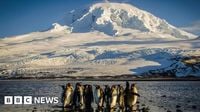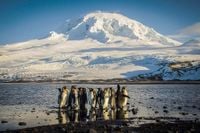In a surprising move, President Donald Trump announced a sweeping import tax scheme on April 2, 2025, targeting a collection of remote islands, including the Heard and McDonald Islands, which are primarily known for their unique ecosystems rather than economic activity. These islands, located 4,000 kilometers (2,485 miles) south-west of Australia, are now subject to a 10% tariff, alongside other Australian territories like the Cocos (Keeling) Islands and Christmas Island. The Norfolk Island, another Australian territory, faces a steeper tariff of 29%.
The announcement has raised eyebrows among environmentalists and economists alike, as the islands are largely uninhabited and serve as a habitat for penguins, seals, and various seabirds. Australian Prime Minister Anthony Albanese expressed his frustration with the tariffs, labeling them as "totally unwarranted" and "not the act of a friend." He emphasized that this decision exemplifies a troubling trend where even the most remote and pristine ecosystems are not safe from geopolitical tensions.
Heard Island and the McDonald Islands were designated as a UNESCO World Heritage site in 1997, recognized for their status as the only volcanically active sub-Antarctic islands. The islands are notable for their dramatic landscapes, with Heard Island being 80% covered by ice and home to the active volcano Mawson Peak. The last significant human activity on Heard Island occurred in 2016 when amateur radio enthusiasts visited the area.
Mike Coffin, a researcher from the University of Tasmania, has traveled to the waters surrounding the islands multiple times for scientific research. He expressed skepticism about the existence of substantial exports from the islands, stating, "There's nothing there." While there are a couple of companies that catch and export Patagonian toothfish and mackerel icefish from the surrounding waters, the economic significance of these exports is minimal. In 2022, the U.S. imported approximately $1.4 million (A$2.23 million) worth of goods from the Heard and McDonald Islands, primarily categorized as unnamed "machinery and electrical" products.
Despite their limited economic output, the islands boast immense ecological value. They are home to millions of marine birds and mammals, including major breeding populations of elephant seals, fur seals, petrels, and albatrosses. The islands are also free from nonnative species, which enhances their conservation significance. The unique wildlife includes species like the Heard Island Cormorant and a subspecies of sheathbill that is found nowhere else.
Geographically, the McDonald Islands are smaller and rockier than Heard Island, which features a large massif known as Big Ben. The last volcanic activity on the McDonald Islands occurred in 2005, following a significant eruption in 1996 that doubled the size of the island. The volcanic activity in this region provides scientists with valuable insights into geological processes and the effects of climate change on coastal environments.
Historically, the islands have seen little human intervention. The first scientific expedition to the area was conducted by the British ship HMS Challenger in 1874. Although there was a research station on Heard Island until 1955, it was closed as Australia shifted its focus to the Antarctic mainland. Limited commercial fishing is permitted in the waters surrounding the islands, but strict regulations are in place to protect the delicate ecosystems.
As the tariffs take effect, the implications for the local economy and international relations remain uncertain. The Australian government, along with environmental advocates, is concerned that these tariffs could set a precedent for further exploitation of remote natural areas. The reaction from the global community has been mixed, with many questioning the rationale behind imposing tariffs on regions with negligible trade activity.
Amid this turmoil, the broader financial markets are feeling the impact. As of April 3, 2025, the S&P 500 futures were down 3.8% in pre-market trading, signaling potential volatility ahead. Investors are anxious about the implications of these tariffs on the U.S. economy and global trade relations.
In the face of these challenges, companies like Walmart are adapting their strategies. The retail giant is reportedly pressuring its Chinese suppliers to implement price cuts of 10% to mitigate the effects of the tariffs. Analysts remain optimistic about Walmart's resilience, with 34 out of 37 analysts rating the stock as a Buy, anticipating a target price nearly 30% higher than its current level.
Meanwhile, other businesses, such as Scotts Miracle-Gro, are navigating the turbulent waters of the new tariff landscape. The company reported a 1.6% increase in Q1 2025 sales, despite facing losses in other areas. As the trade war escalates, the focus will be on how these corporate giants adapt to a shifting economic environment.
The situation surrounding the tariffs on the Heard and McDonald Islands serves as a stark reminder of the interconnectedness of global trade and environmental conservation. As leaders grapple with the consequences of these decisions, the fate of remote ecosystems hangs in the balance, raising questions about the future of international trade policies and their impact on our planet.






